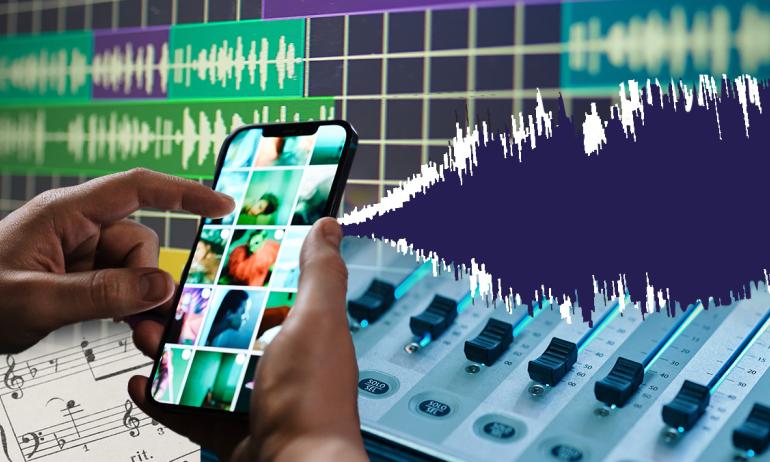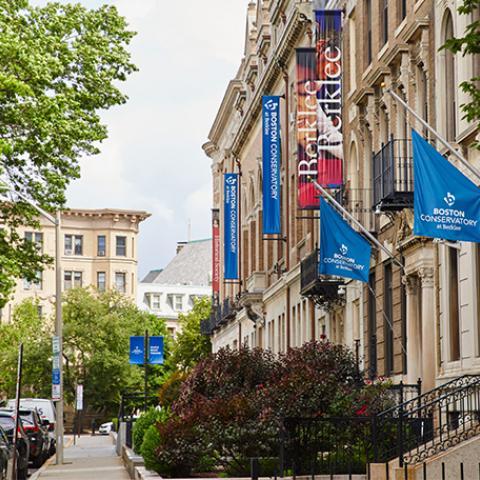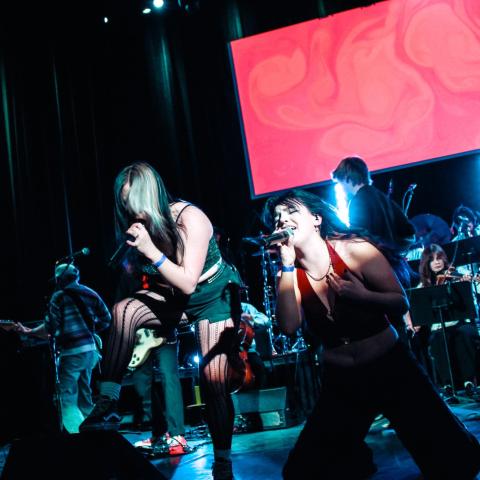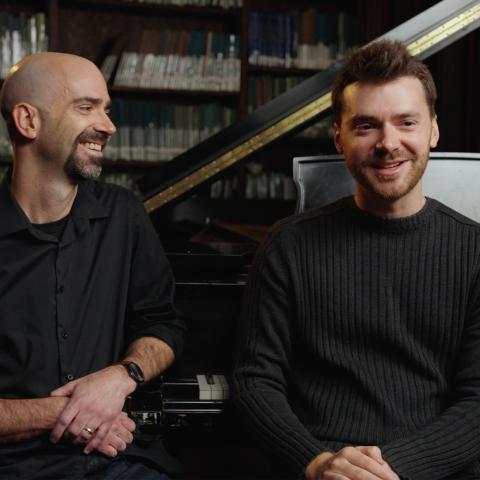Powering Collaboration at Berklee NYC
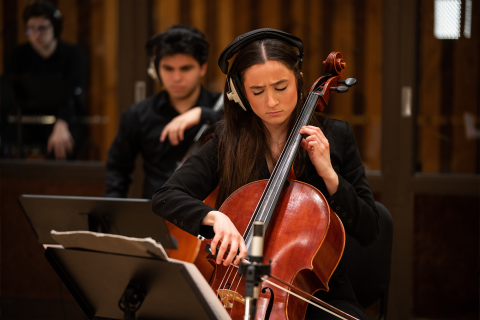
Boston Conservatory students Elaina Spiro (foreground) and Andrés Celis (background)
Photo by Ryan Nava
Elaina Spiro (B.M. '24, cello) admits she was a bit nervous when the time came to record her solo track at Power Station Studios, Berklee’s flagship recording facility in New York City. Not only is Power Station one of the best-equipped studios on the planet, it boasts a long and storied history of sessions by iconic artists like David Bowie, Herbie Hancock, Madonna, Bruce Springsteen, and the Rolling Stones, not to mention the original Broadway casts of Hamilton and Les Misérables.
For the first time in her budding career, Spiro was recording an isolated take at a world-class facility—in front of 15 classmates, the entire Power Station staff, and the Berklee College of Music student who’d composed the piece, Dana Zulpykharova B.M. '23. The completed recording was to be the culmination of a collaborative project linking Conservatory instrumentalists with composers from the College’s Screen Scoring Department.
With everyone in the room watching, Spiro wanted to nail the take on her first try. And when the solo moment arrived, she says, her performance anxiety all but disappeared, displaced by the awe of working at Power Station and the palpable support of her fellow students.
It's an honor that my first exposure to what I want to do for the rest of my life gets to be in such a special space—which is the incredible thing about going to Boston Conservatory and having that connection with Berklee and all of Berklee’s venues across America and the world, really.
–Elaina Spiro
“I think that moment was my best time playing it," she says. “The energy that I had from all of my friends in the orchestra and everyone in the booth—just the excitement and the safety that I felt to be able to do my best—that’s what it’s about.”
Getting the chance to record original pieces by screen scoring students was particularly meaningful for Spiro, who hopes to make a career of working with film composers. “It's an honor that my first exposure to what I want to do for the rest of my life gets to be in such a special space—which is the incredible thing about going to Boston Conservatory and having that connection with Berklee and all of Berklee’s venues across America and the world, really.”

Chair of Instrumental Studies Matthew Marsit (far right) conducts student instrumentalists during a recording session at the Power Station at Berklee NYC.
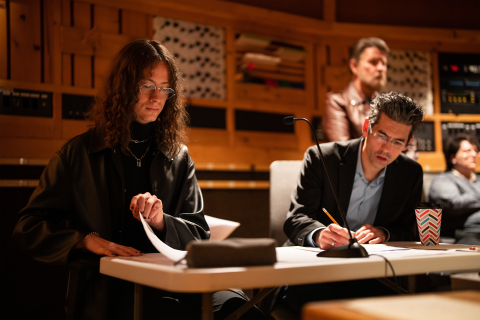
Berklee screen scoring student Joel Lindberg B.M. '25 (left) and Chair of Screen Scoring Sean McMahon (right) listen from the booth during a recording of Lindberg's original composition "Imaginarium."
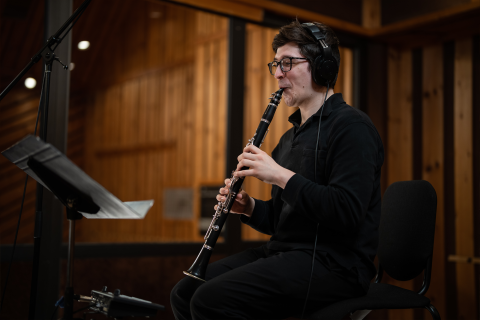
Boston Conservatory student Daniel Meza (M.M. '23) records a clarinet solo at Power Station studios.
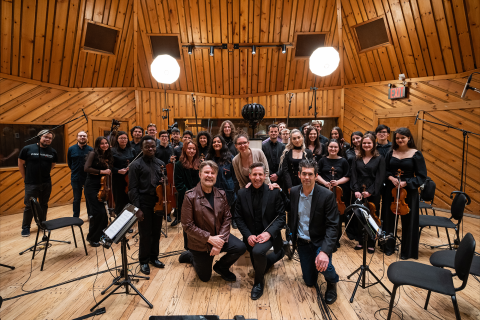
Berklee NYC's executive director Stephen Webber (front left), Matthew Marsit (front center), and Sean McMahon (front right) pose with students and Power Station staff members.
The collaborative project was conceived and developed by Matthew Marsit, chair of instrumental studies at the Conservatory, and Sean McMahon, chair of screen scoring at the College. A call for scores resulted in seven student compositions being chosen to record at Berklee NYC. The resulting tracks will be used as each composer’s respective “header,” the lead-off piece of their recorded portfolio.
For several days prior to the recording session, the student ensemble (including 14 string players, a French horn player, and a woodwind doubler on clarinet and flute) rehearsed each piece with the composer present. For the composers, this was a rare chance to hear their work played live, experiment with small changes, and make revisions to the final score in real time.
Screen scoring major Joel Lindberg B.M. '25 says the process allowed him to adjust the string arrangements on his piece “Imaginarium,” resulting in a stronger, more balanced recording. “It helped me realize that some pizzicato lines would be drowned out by the bowed strings, and that there were some changes that needed to be made to the texture,” he said. “I wouldn't have picked up on that without the opportunity to hear the dynamics of the live players beforehand.”
Communicating directly with composers is a creative windfall for the instrumentalists as well, Marsit says. Not only does it offer them a more nuanced understanding of the score, it enables them to help shape the piece. “To be able to hear [the composer] talk through their inspiration and their idea, and then to offer them that feedback, it allows the composer to grow, it allows the artist to grow, and it allows the piece of music to gain new life in a really exciting way.”
It also provides students with high-level, professional experience they can carry with them into their first paid recording job. Marsit says that, above all, he wants opportunities like these to equip Conservatory students with “the ability to say yes.”
“When a future contractor calls and says, ‘Can you do this?’ or ‘Do you have experience with that?,’ the answer is yes, because we’ve offered them such incredible variety.”
For Spiro, the Power Station experience has already paid off professionally. That 20-second solo recording—and the networking contacts she made at Berklee NYC—led to an audition with a film company this summer.
“It just gives me so much confidence,” she says. “Of course, there’s so much I have to continue to learn, but it’s never going to be my first time dipping my toes into that sort of environment. I know what to expect, and I know how to prepare so that the next time I’ll feel even more comfortable.”
Listen to Elaina Spiro's solo on "The Great Steppe" by Dana Zulpykharova and Joel Lindberg's original composition "Imaginarium," then explore the rest of the screen scoring composition playlist.

